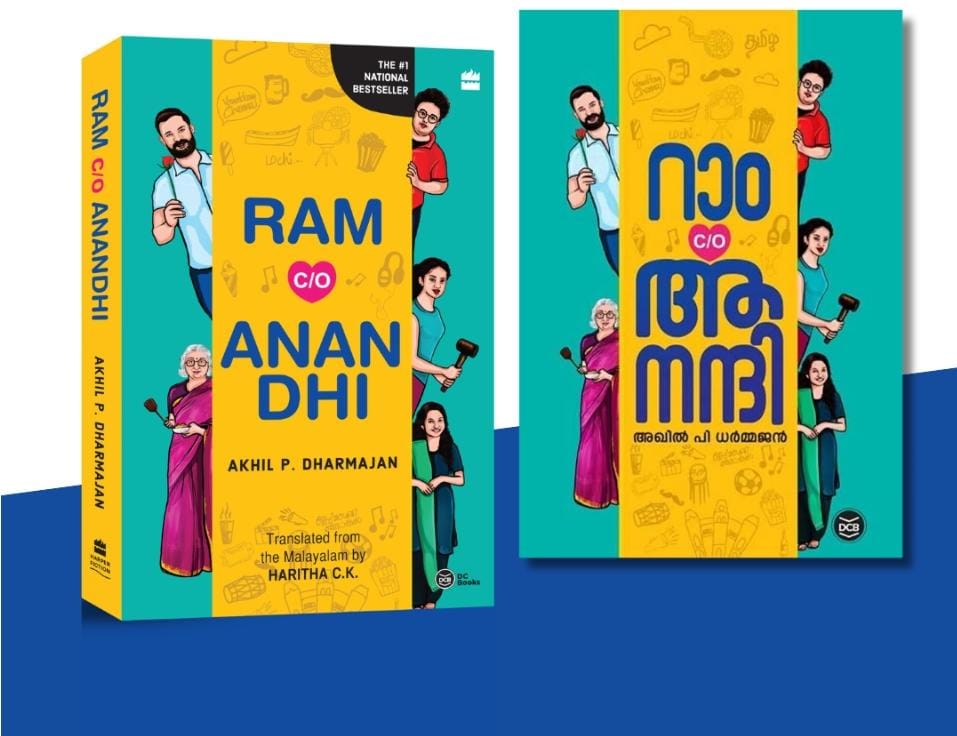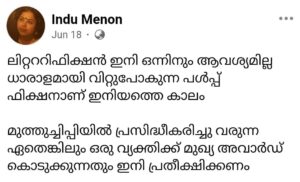Author Indu Menon, herself a Yuva Puraskar recipient in 2014, dismissed Akhil P Bharmajan's 'Ram C/o Anandhi' as “pulp fiction,” likening it to the soft-porn Malayalam magazine 'Muthuchippi'.
Published Aug 23, 2025 | 8:00 AM ⚊ Updated Aug 23, 2025 | 8:00 AM

HarperCollins calls the book “an emotionally charged, unputdownable novel about love, revenge, loss, and friendship.”
Synopsis: A row over awarding the Sahitya Akademi Yuva Puraskar to Akhil P Dharmajan has snowballed into a major issue, with accusations of misogyny, body-shaming, and defamation, leaving Kerala’s literary community bitterly divided.
What began as a celebration of young literary talent has spiralled into one of the fiercest debates literary Kerala has seen in recent years.
When 34-year-old Malayalam novelist and scriptwriter Akhil P Dharmajan was awarded the Sahitya Akademi Yuva Puraskar 2025 on 18 June for his debut novel Ram C/o Anandhi, the honour was expected to mark a milestone in contemporary Malayalam writing.
Instead, it has ignited a war of words over the boundaries of “literary merit” and the role of popular fiction in national recognition.
First published in 2020, Ram C/o Anandhi quickly grew into a publishing sensation.
Blending romance, humour, and social issues such as transgender lives and the Sri Lankan refugee crisis, the novel struck a chord with young readers.

Author Akhil P Dharmajan.
Written in what Dharmajan describes as a “cinematic style”, the book was marketed as a story to be read like a movie ticket—fast-paced, emotional, and highly visual.
The Malayalam edition sold more than four lakh copies, while its English translation by Haritha CK, brought out by HarperCollins, has also been a bestseller.
Critics and fans alike credit the novel with reviving the romance genre in Malayalam popular fiction, while its viral success on social media reels amplified its reach among first-time readers.
HarperCollins calls the book “an emotionally charged, unputdownable novel about love, revenge, loss, and friendship.”
The novel will soon unfurl on the silver screen. Dharmajan, in a social media post in December 2023, stated that the film, directed by debutant Anusha Pillai and produced by Vignesh Vijayakumar under Wealth Eye Cinemas, promises to bring the beloved characters of Ram and Anandhi alive for audiences.
Dharmajan’s path to literary fame was anything but unconventional. Hailing from a modest working-class family in Pathirapalli, Alappuzha, he sold the first 1,000 copies of his book at railway stations and bus stands.
Holding a Mechanical ITI degree along with diplomas in engineering and filmmaking, he was already known in the Malayalam film industry as the screenplay writer of the blockbuster film, 2018, India’s official entry to the 96th Academy Awards.
His earlier works, Mercury Island and Ouija Board, found their own readership, but it was Ram C/o Anandhi that transformed him into a household name.
But what sets him apart from other novelists is not just his storytelling, but the way he turned his debut into a phenomenon — by cleverly using social media as his primary stage, transforming book marketing into a viral cultural movement.
The novel follows Ram, a young man from Alappuzha, who moves to Chennai with dreams of mastering filmmaking and writing a novel. His life changes when he meets Anandhi, a feisty college receptionist.
What begins as animosity slowly transforms into an intense, tumultuous relationship.
Set against the backdrop of college life, the book touches on wider issues of displacement, identity, and belonging, while keeping its core anchored in romance and youthful aspirations.
The Sahitya Akademi Yuva Puraskar, which recognises promising young writers, this year honoured 23 authors across various Indian languages.

Indu Menon.
Yet, in Kerala, the announcement triggered sharp criticism from within the state’s literary establishment after it selected Dharmajan for his Ram C/o Anandhi.
Author Indu Menon, herself a Yuva Puraskar recipient in 2014, dismissed the book as “pulp fiction,” likening it to the soft-porn Malayalam magazine Muthuchippi.
Her social media post declaring, “These are the times of pulp fiction, and there is no place for literary fiction,” went viral, sparking heated exchanges online.
Literary critic PK Rajashekaran called the award undeserved, accusing the jury of valuing sales over quality.
Veteran novelist M Mukundan noted that classics such as OV Vijayan’s Khasakkinte Ithihasam (The Legends of Khasak) sold only a fraction of such numbers but remain immortal for their depth.
Poet Kalpetta Narayanan warned the award could set a “troubling precedent,” while writer Jisa Jose questioned whether the book meaningfully engaged with the issues it touched upon.
Some even suggested the very title, “Ram”, may have found resonance in an era of rising Hindutva sentiments—a claim Dharmajan rejected.
Not everyone agreed with the backlash. Writers and critics rallied in defense of Dharmajan, arguing that the debate revealed elitism in Malayalam literary circles.
Former Yuva Puraskar winner Abin Joseph reminded critics that many once-derided popular authors, like Muttathu Varkey, were later recognised as literary figures. Ashokan Cheruvil praised the novel for weaving in themes like the refugee crisis and LGBTQ identities without nostalgia or moral pretension. Author Chandramathi admitted she read it out of curiosity and found its style refreshing.
Critic Saradakutty condemned the online attacks, insisting, “The merit of a creative work is not decided by an award, jealous writers, or critics. The truth of a work will be proven by time.”
The row soon spilled into courtrooms. Dharmajan filed a defamation case against Indu Menon over her comparison of his book to Muthuchippi, prompting a Kerala court to issue notice on August 19.
Considering the defamation suit, Ernakulam CJM Court sent notice to Indu Menon directing her to appear before the court on 15 September.
The feud also played out on social media platforms, with hashtags like #AkhilPDharmajan and #YuvaPuraskarControversy trending. Supporters flooded feeds with reels celebrating the book, while detractors shared memes mocking it as “painkili” (pulp) fiction.
On 20 August, Dharmajan broke his silence, stating that he was being unfairly targeted with allegations that he had “bought” the award. Without directly naming author Indu Menon, he accused a senior writer of insulting him and his family, citing her comment that he had to “carry the shame” of a bribed award for life.

Indu Menon’s post that triggered the controversy.
Defending himself, Dharmajan said criticism of his book Ram C/o Anandhi was welcome, but personal attacks on his father, a lottery seller, and accusations of corruption, crossed all boundaries.
“Is dragging a man who toils to make a living also book criticism?” he asked, recalling his father’s pride when the award was announced.
While welcoming genuine criticism of his book, Dharmajan insisted that the issue had crossed into “personal assassination” and maintained he never incited or paid anyone to attack Indu Menon online.
On her part, Indu Menon alleged on 16 August that she was subjected to a coordinated “virtual mob lynching” led by the writer’s “gang members”, after her remarks, claiming over 150 misogynistic posts and 1,000 abusive comments were directed at her.
She also urged supporters to send her evidence of derogatory posts for “academic purposes.”
Earlier, on 18 June, Indu Menon had criticised the Akademi’s decision, calling Ram C/o Anandhi “pulp fiction” and remarking sarcastically that future awards might go to works published in the popular magazine Muthuchippi.
The controversy has now spilled beyond the realm of literary criticism into accusations of misogyny, body-shaming, and defamation, leaving Kerala’s literary community bitterly divided.
Only time will tell whether Ram C/o Anandhi stands the test of time or fades as a passing trend, but the controversy has already forced Malayalam literature to confront an uncomfortable question: Who gets to decide what counts as “literature”?
(Edited by Majnu Babu).
